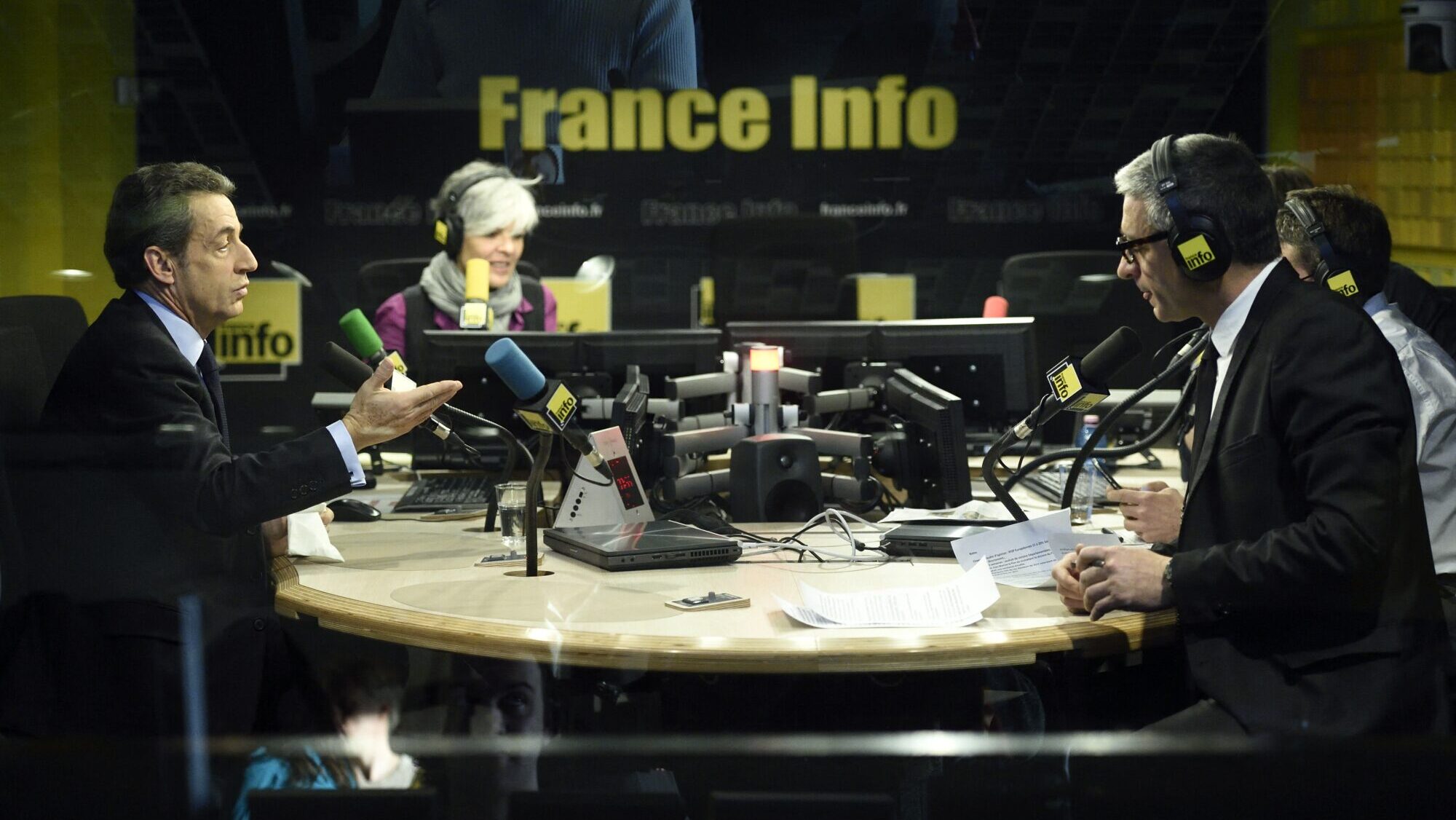
Jean-Francois Achilli (R) interviews former French President Nicolas Sarkozy (L)
ERIC FEFERBERG / AFP
Managers at French public service radio just dismissed journalist Jean-François Achilli for “serious misconduct,” on the grounds that he was considering working with Rassemblement National (RN) president Jordan Bardella. The basis for the sacking is problematic, in that there were never any more than informal exchanges between the two men—proof instead of political censorship.
It took several weeks for the case to reach a conclusion. On March 14th this year, Achilli—presenter of the programme Les Informés on France Info radio and an employee of the public broadcasting service—was suspended and taken off air. The decision followed revelations in an article in Le Monde alleging that the journalist and RN president Bardella and head of its list for the European elections, had exchanged views, with the idea of writing a biography of the right-wing nationalist politician.
The charges against the presenter are based on very slim facts. Excerpts written by Bardella were allegedly submitted for Achilli’s approval, who in turn refused to take part in the biographical work envisaged by Bardella. But according to Le Monde, the journalist ‘nonetheless worked in the shadows, helping Bardella recover his memories, thus enabling the beginnings of a text to see the light of day’. This was enough to trigger proceedings against Achilli by the management of the Radio France group, leading to his dismissal for serious misconduct a month and a half later, on Monday, April 29th.
As far as ‘serious misconduct’ is concerned, there was never any contract or actual collaboration between the two men. At the time of his suspension, Achilli pointed out that his exchanges with Bardella were part of ‘his personal professional life’. Bardella, for his part, was outraged at the fate of the journalist: “I have just learned that Radio France is suspending one of its journalists for a “supposed” exchange about a book of interviews with me that never saw the light of day. These methods used by the public service are worthy of the worst regimes and are a disgrace to democracy.”
Achilli has since vigorously defended himself in a post on X:
I have not broken any professional or ethical rules. I spoke with Jordan Bardella as I have done with all politicians for the past twenty-five years. At his request, we talked about how he might express himself in a book of interviews. I refused the project. Since when can’t political journalists talk to all politicians? I am stunned by the brutality of the unjustified action taken against me by the management of France Info, which is seriously damaging my reputation.
Radio France maintains, however, that Achilli’s involvement in Bardella’s project, even on a one-off basis, constitutes a “serious conflict of interest.” Achilli’s involvement in a festival in Brittany called Think Forward, set up at the initiative of a local Les Républicains councillor, —although declared to management in accordance with the Radio France group’s internal procedures—is also being cited as evidence against him.
It is not yet known whether Achilli intends to acquiesce, or whether he intends to take the matter to an industrial tribunal to challenge a clearly unfair dismissal.
The interpenetration of political circles with journalistic circles is a near-universal trend, and never poses any problems of conscience—since it is generally to the benefit of the Left. Journalists’ collaboration on memoirs or autobiographies of political figures is commonplace, and hardly ever gives rise to calls to order when mainstream figures are involved.
In a speech to the National Assembly on the Achilli case, RN MP Philippe Ballard cited several examples from the recent past of French publishing. Culture Minister Rachida Dati replied that the parallel did not apply, since the personalities quoted were bound by an explicit contract. What’s more, ethical rules have been tightened since June 2023: “Prior to any collaboration, or even at the limit of any discussion, to avoid any conflict of interest, all Achilli had to do was inform his management to say whether there was any collaboration envisaged. This was not the case, as Radio France found out through the press,” Dati said.
Double standards in Achilli’s case have been denounced by several voices on the Right. One example put forward is the case of journalist Léa Salamé, one of Achilli’s colleagues. Currently in a relationship with the socialist Raphaël Glucksmann, who heads the Socialist Party list for the European elections, she was finally taken off the air only after the Achilli scandal—for good measure.
